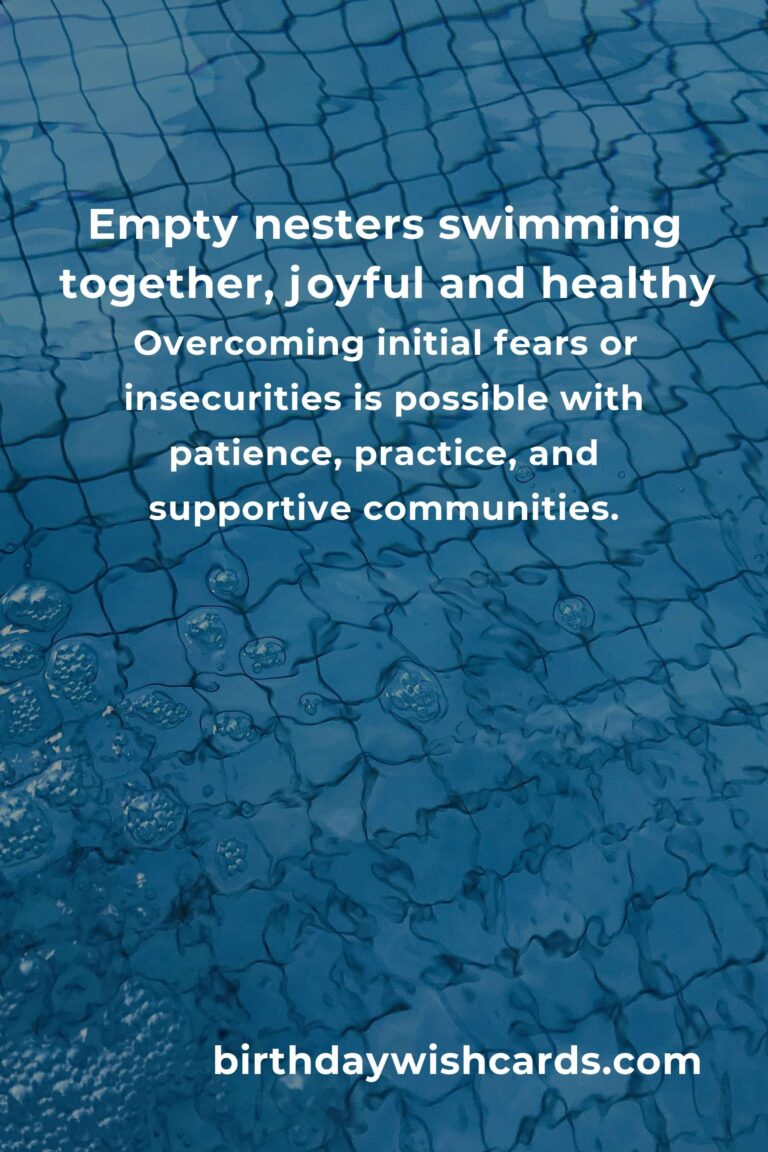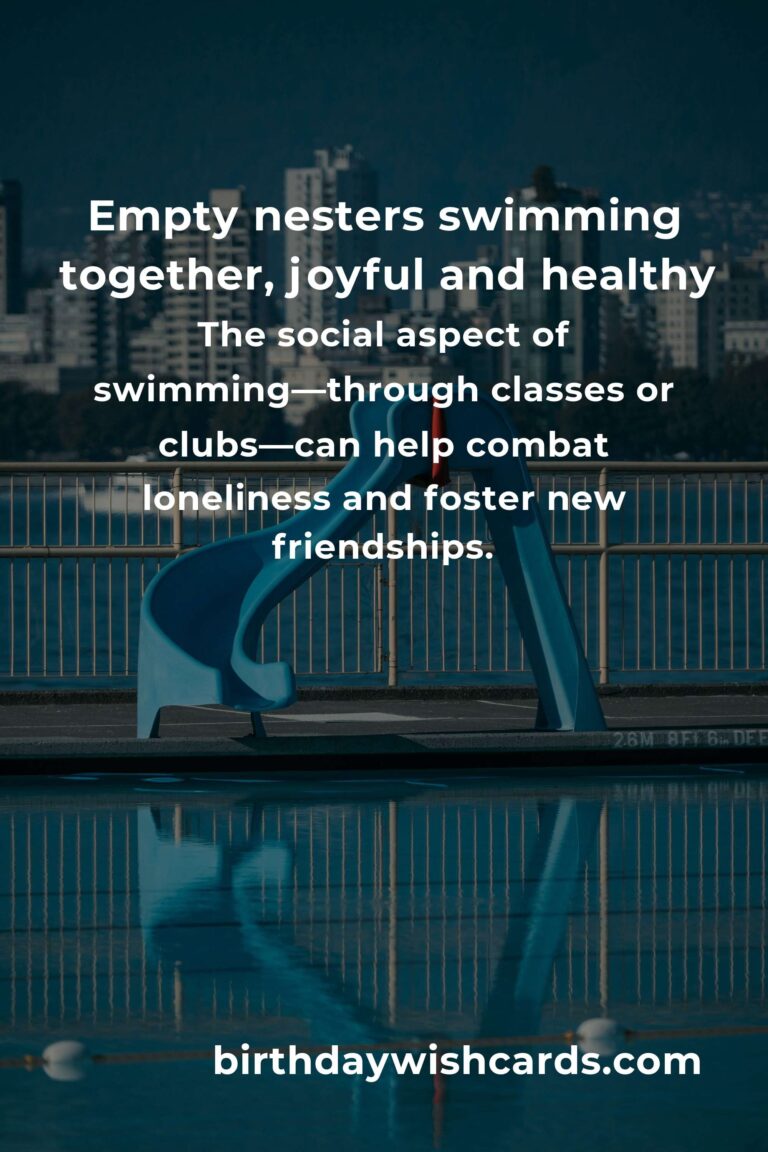
For many parents, the day the last child leaves home marks a turning point. The house is quieter, routines are upended, and a new chapter begins—one filled with opportunity, growth, and yes, even a touch of uncertainty. If you find yourself in this season, you’re not alone. The empty nest years can be both liberating and daunting, but they’re also a time to reconnect with your own passions, health, and community.
Swimming stands out as one of the most beneficial and refreshing activities you can embrace during this pivotal life stage. Whether you’re a lifelong swimmer or haven’t dipped a toe in the pool since high school, it’s never too late to dive in. This comprehensive guide will walk you through the emotional, physical, and social benefits of swimming for empty nesters, and offer practical advice to help you get started with confidence and joy.
Why Swimming is Perfect for the Empty Nest Phase
As you step into this new era, prioritizing your well-being is essential. Swimming offers unique advantages, especially for individuals in midlife and beyond:
- n
- Low Impact, High Results: Swimming is gentle on joints but provides a full-body workout, making it ideal for adults with arthritis or those wary of high-impact activities.
- Cardiovascular Health: Regular swimming strengthens your heart, lowers blood pressure, and improves circulation.
- Mental Clarity: The soothing rhythm of water and focused breathing can reduce stress and anxiety, promoting mental well-being.
- Social Engagement: Community pools and swim clubs offer a chance to meet new friends and stay engaged.
- Reigniting Passion: Rediscovering or learning to swim can reignite a sense of adventure and personal achievement.
n
n
n
n
Embracing Change: Emotional Benefits of Swimming
The transition to an empty nest can stir a mix of emotions—pride, nostalgia, loneliness, and excitement. Swimming provides a powerful outlet for processing these feelings:
- n
- Mindful Movement: The repetitive motion and sound of water can be meditative, helping to quiet worries and foster presence.
- Building Confidence: Setting and achieving swimming goals—whether it’s mastering a new stroke or swimming a set number of laps—can boost self-esteem.
- Sense of Accomplishment: Returning to or learning a skill later in life brings a unique sense of pride and fulfillment.
- Release of Endorphins: Physical activity, especially in water, releases feel-good hormones that combat sadness or anxiety.
n
n
n
Health Benefits: Swimming for Body and Mind
As we age, our bodies crave movement that supports longevity and vitality. Swimming delivers on all fronts:
Physical Health
- n
- Improved Flexibility: Water supports your body, allowing for a greater range of motion with less risk of injury.
- Muscle Tone and Strength: Pushing against water’s resistance builds strength and tones muscles all over your body.
- Weight Management: Swimming burns calories efficiently, aiding in weight management and overall energy levels.
- Bone Health: While not weight-bearing like walking, swimming still activates muscles and joints, which can help maintain bone density.
n
n
n
Mental Health
- n
- Stress Relief: Immersing yourself in water has a calming effect on the nervous system.
- Improved Sleep: Regular swimmers often report better sleep quality—vital during life transitions.
- Enhanced Mood: Being in or near water can elevate mood and create a sense of peace.
n
n
Getting Started: Practical Steps for Empty Nesters
Ready to take the plunge? Here’s how you can start swimming, no matter your skill level or background:
1. Find Your Pool
Begin by researching local pools, community centers, or fitness clubs. Many offer senior discounts, adult swim hours, or women-only sessions for added comfort.
2. Assess Your Skill Level
Be honest about your abilities. If it’s been years since you swam, consider signing up for adult swim lessons. Many pools offer classes specifically for beginners or those looking to refresh their skills.
3. Get the Right Gear
- n
- Swimsuit: Choose one that fits comfortably and offers the coverage you prefer.
- Goggles: Essential for protecting your eyes and seeing clearly underwater.
- Swim Cap: Keeps hair out of your face and reduces drag.
- Flip-flops and Towel: For comfort and hygiene on the pool deck.
n
n
n
4. Start Slow
Don’t pressure yourself to swim long distances right away. Start with short sessions, focusing on building comfort in the water. Even 10-15 minutes of swimming or water walking can be beneficial.
5. Mix It Up
Try different strokes—freestyle, backstroke, breaststroke, or even simple water aerobics. Variety keeps things interesting and works different muscle groups.
6. Set Realistic Goals
Set small, attainable goals, like swimming two laps without stopping or attending a class twice a week. Celebrate your progress!
7. Listen to Your Body
Pace yourself. If you feel tired or uncomfortable, take a break. Hydrate well, even if you don’t feel thirsty in the water.
Building Community: The Social Side of Swimming
Isolation can be a challenge for empty nesters, but swimming provides a natural way to meet others:
- n
- Join a Swim Club: Many pools have adult swim teams or social swim groups, welcoming all abilities.
- Attend Water Aerobics: These instructor-led classes are fun, energizing, and a great way to connect.
- Volunteer: Offer to help at swim meets or children’s lessons—giving back keeps you involved and engaged.
n
n
Swimming with others can turn exercise into a joyful, shared experience, fostering new friendships and a sense of belonging.
Overcoming Common Hurdles
It’s natural to have concerns or hesitations about starting a new activity. Here are some common obstacles and how to overcome them:
- n
- Body Image Concerns: Remember, pools are inclusive spaces. Focus on health, not comparison.
- Fear of Water: Start in the shallow end, or try water walking before swimming laps. Enroll in lessons if needed.
- Physical Ailments: Swimming is adaptable. Use kickboards or noodles, and consult with a healthcare provider if you have medical concerns.
- Unfamiliarity: Ask for a pool orientation, or attend with a friend the first time to feel more at ease.
n
n
n
Staying Motivated: Making Swimming a Lasting Habit
Long-term success comes from enjoyment and consistency. Here’s how to keep swimming a positive part of your routine:
- n
- Track Your Progress: Log your swims, distances, or how you feel after each session.
- Sign Up for Events: Many pools host fun swims, charity events, or friendly competitions—great motivators!
- Find a Swim Buddy: Having someone to swim with increases accountability and fun.
- Reward Yourself: Celebrate milestones with a new swimsuit, a massage, or a healthy treat.
n
n
n
Real-Life Stories: Inspiration from Fellow Empty Nesters
Linda, 58, rediscovered swimming after her youngest left for college. “I was looking for something to fill my mornings. At first, I felt silly, but soon the pool became my sanctuary. I’ve made new friends and feel stronger than I have in years.”
David, 62, never learned to swim as a child. “After becoming an empty nester, I signed up for adult lessons. It was humbling, but now I swim three times a week. It’s given me confidence and a sense of accomplishment I never expected.”
Frequently Asked Questions
Is swimming safe for older adults?
Yes! Swimming is one of the safest forms of exercise for all ages, especially empty nesters. Always consult with your doctor before starting any new activity, especially if you have existing health conditions.
What if I don’t know how to swim?
It’s never too late to learn. Many pools offer adult beginner lessons in a supportive, non-judgmental setting. Start at your own pace and celebrate each step.
How often should I swim?
For general health benefits, aim for at least 2-3 times a week. Listen to your body and adjust as needed.
Can swimming help with loneliness?
Absolutely. Swimming can be a social activity. Joining classes or swim clubs connects you with others facing similar life transitions.
Final Thoughts: Embracing the Empty Nest with Confidence
Transitioning to an empty nest is a profound life event—one that brings both challenges and opportunities. Swimming offers a path to renewed health, emotional resilience, and vibrant social connection. Whether you’re gliding through the water solo or laughing with new friends in a water aerobics class, the pool is a place where you can rediscover yourself, one stroke at a time.
So why not take the plunge? You deserve the joy, strength, and serenity that swimming can bring. Your journey in the water is just beginning—and the best is yet to come.
Swimming is an ideal, low-impact exercise for empty nesters seeking to boost both physical and mental health.
Engaging in swimming can help ease the emotional transition after children leave home, offering a sense of routine and accomplishment.
The social aspect of swimming—through classes or clubs—can help combat loneliness and foster new friendships.
It’s never too late to learn to swim or improve your skills; many pools offer supportive adult lessons.
Starting small and setting realistic goals can make swimming enjoyable and sustainable for the long term.
The water’s soothing environment is perfect for mindful movement and stress relief.
Swimming strengthens the heart, tones muscles, and can help maintain a healthy weight with minimal risk of injury.
Joining group water activities like aerobics can make exercise fun and engaging.
Overcoming initial fears or insecurities is possible with patience, practice, and supportive communities.
Embracing swimming in the empty nest years can reignite joy, confidence, and a sense of belonging.
#EmptyNestSwimming #ActiveAging #SwimForHealth #LifelongWellness #RediscoverYourself #EmptyNestJoy #WaterWellness #NewBeginnings #SwimCommunity #HealthyTransitions

